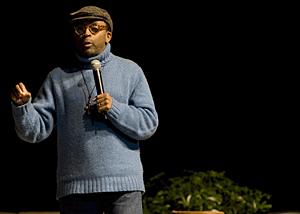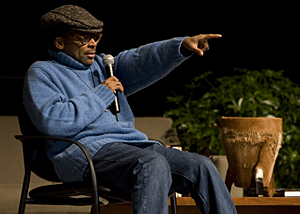- Rozovsky wins prestigious NSF Early Career Award
- UD students meet alumni, experience 'closing bell' at NYSE
- Newark Police seek assistance in identifying suspects in robbery
- Rivlin says bipartisan budget action, stronger budget rules key to reversing debt
- Stink bugs shouldn't pose problem until late summer
- Gao to honor Placido Domingo in Washington performance
- Adopt-A-Highway project keeps Lewes road clean
- WVUD's Radiothon fundraiser runs April 1-10
- W.D. Snodgrass Symposium to honor Pulitzer winner
- New guide helps cancer patients manage symptoms
- UD in the News, March 25, 2011
- For the Record, March 25, 2011
- Public opinion expert discusses world views of U.S. in Global Agenda series
- Congressional delegation, dean laud Center for Community Research and Service program
- Center for Political Communication sets symposium on politics, entertainment
- Students work to raise funds, awareness of domestic violence
- Equestrian team wins regional championship in Western riding
- Markell, Harker stress importance of agriculture to Delaware's economy
- Carol A. Ammon MBA Case Competition winners announced
- Prof presents blood-clotting studies at Gordon Research Conference
- Sexual Assault Awareness Month events, programs announced
- Stay connected with Sea Grant, CEOE e-newsletter
- A message to UD regarding the tragedy in Japan
- More News >>
- March 31-May 14: REP stages Neil Simon's 'The Good Doctor'
- April 2: Newark plans annual 'wine and dine'
- April 5: Expert perspective on U.S. health care
- April 5: Comedian Ace Guillen to visit Scrounge
- April 6, May 4: School of Nursing sponsors research lecture series
- April 6-May 4: Confucius Institute presents Chinese Film Series on Wednesdays
- April 6: IPCC's Pachauri to discuss sustainable development in DENIN Dialogue Series
- April 7: 'WVUDstock' radiothon concert announced
- April 8: English Language Institute presents 'Arts in Translation'
- April 9: Green and Healthy Living Expo planned at The Bob
- April 9: Center for Political Communication to host Onion editor
- April 10: Alumni Easter Egg-stravaganza planned
- April 11: CDS session to focus on visual assistive technologies
- April 12: T.J. Stiles to speak at UDLA annual dinner
- April 15, 16: Annual UD push lawnmower tune-up scheduled
- April 15, 16: Master Players series presents iMusic 4, China Magpie
- April 15, 16: Delaware Symphony, UD chorus to perform Mahler work
- April 18: Former NFL Coach Bill Cowher featured in UD Speaks
- April 21-24: Sesame Street Live brings Elmo and friends to The Bob
- April 30: Save the date for Ag Day 2011 at UD
- April 30: Symposium to consider 'Frontiers at the Chemistry-Biology Interface'
- April 30-May 1: Relay for Life set at Delaware Field House
- May 4: Delaware Membrane Protein Symposium announced
- May 5: Northwestern University's Leon Keer to deliver Kerr lecture
- May 7: Women's volleyball team to host second annual Spring Fling
- Through May 3: SPPA announces speakers for 10th annual lecture series
- Through May 4: Global Agenda sees U.S. through others' eyes; World Bank president to speak
- Through May 4: 'Research on Race, Ethnicity, Culture' topic of series
- Through May 9: Black American Studies announces lecture series
- Through May 11: 'Challenges in Jewish Culture' lecture series announced
- Through May 11: Area Studies research featured in speaker series
- Through June 5: 'Andy Warhol: Behind the Camera' on view in Old College Gallery
- Through July 15: 'Bodyscapes' on view at Mechanical Hall Gallery
- More What's Happening >>
- UD calendar >>
- Middle States evaluation team on campus April 5
- Phipps named HR Liaison of the Quarter
- Senior wins iPad for participating in assessment study
- April 19: Procurement Services schedules information sessions
- UD Bookstore announces spring break hours
- HealthyU Wellness Program encourages employees to 'Step into Spring'
- April 8-29: Faculty roundtable series considers student engagement
- GRE is changing; learn more at April 15 info session
- April 30: UD Evening with Blue Rocks set for employees
- Morris Library to be open 24/7 during final exams
- More Campus FYI >>
2:23 p.m., Feb. 24, 2009----On a bitter cold evening, legendary filmmaker Spike Lee got a warm welcome from the crowd of more than 1,500 in the Bob Carpenter Center.
The director of critically acclaimed films such as She's Gotta Have It and Do the Right Thing, Lee appeared Monday, Feb. 23, as part of Black History Month activities at the University of Delaware, which have as a theme, “A Change Has Come: A New Era of Black Leadership.”
In welcoming the Academy Award-nominated filmmaker, Newark Mayor Vance Funk III proclaimed Monday, Feb. 23, as Spike Lee Day, noting, “When I heard Spike Lee was coming to Newark for Black History Month, I thought it would be very nice to recognize him for all of the great achievements he has had throughout his life.”
Lee began his remarks on his career in films, the state of race relations in America and the election of Barack Obama as the 44th president of the United States, with a quip that he was glad to be at UD to celebrate Black History Month, “even if it occurs during the shortest month of the year.”
“Growing up, I had no idea that I wanted to be a filmmaker,” Lee said. “My mother would drag me to films and to Broadway plays. I never wanted to go, but luckily, that's where the seeds were planted. I thought I was going play second base for the New York Mets. I had the heart, but not the physical tools, but that heart became very useful in the film industry.”
To nurture the future success of young people, Lee said it is important that they be made aware of the many fields in which career opportunities exist.
“Young people may have great talents,” Lee said, “but they will not achieve success because they were not given this exposure.”
Lee also remembered that his parents, Jacqueline Shelton and William James Edward Lee III, continually reminded him that to achieve success in the United States, African Americans had to try a lot harder.
“Both of my parents drilled in our head that to succeed in America you could not be just as good as your white counterparts,” Lee said. “If you ask any successful African American, they will tell you that being good enough is not enough to get by.”
In his first years at Morehouse College in Atlanta, Lee said he did just enough to get by, and that at the end of his sophomore year his adviser told him to “think long and hard” over the summer so that he would have a plan when he returned in the fall.
“It was in that summer of 1977 that film found me. For Christmas someone had given me a Super 8 film camera and a box of film,” Lee said. “That summer, New York City was in dire financial straits. There were no summer jobs, no nothing. So I spent that whole summer running around New York City shooting stuff with my Super 8 camera.”
Having filmed everything from looting during heat-induced blackouts, to street corner musicians, to the public terror caused by the “Son of Sam” murders, Lee returned to Morehouse and declared his major in mass communications.
Lee said that it was during his graduate career at the New York University Tisch School of the Arts that he filmed his thesis, Joe's Bed-Stuy Barbershop: We Cut Heads.
“When you are in film school, you spend very little time in the classroom,” Lee said. “Most of your time is out making films, working on your films and your classmates' films.”
Lee also talked about working with Denzel Washington, describing him as being “one of the smartest actors we have.”
“When we were getting ready to do Malcolm X, Denzel said, 'I have to become a vessel for the spirit of Malcolm X to come though me,'" Lee said. “He started to read the Koran and pray in Arabic. I am a witness that this happened.”
While being nominated for major film industry honors like the Academy Award is great, Lee said that is not the reason why he and actors like Washington are in the filmmaking business.
“What is important is that Denzel and myself are not in it for the awards,” Lee said. “If the awards come, that is all right, but that is not why we do it.”
Lee said that African Americans must achieve gatekeeper positions for films to truly encompass the important issues of their historical and cultural experience.
“Gatekeepers are the people who decide we are making this film or we are not making this film,” Lee said. “Until we get gatekeeper positions, a lot of stuff is not going to change.”
Movies, music, fashion and other cultural contributions are what make the United States the most recognized country in the world, Lee said.
“The reason we dominate is because of culture,” Lee said. “Go anyplace in the world, and you are going to hear hip hop.”
In noting that his own success rests on the support of parents, professionals, classmates and friends, Lee said that opportunities for success for most African Americans have historically been limited.
“We have a problem when young black men say they don't expect to live past the age of 18,” Lee said. “There is something wrong, and we should not be OK with that, and that there are more young black men in jail than enrolled in college.”
Lee said that the Obama family in the White House represents a new image of the possibilities to which African Americans can aspire.
“This is a great moment in American history. Some of us don't fully understand what we have seen,” Lee said. “A great leap was made with the election of Barack Obama. We are all lucky to be alive to see this.”
While the election of President Obama represents the latest event in a drama that began with the Emancipation Proclamation made by President Lincoln in 1863, Lee said he has his doubts about what some are calling the “post-race” period in American history.
“We as a country, black and white, have not really talked about slavery, and we have not really talked about Native Americans. We have to be smarter as we move forward,” Lee said.
Monday's event was sponsored by the Cultural Programming Advisory Board, the Center for Black Culture, the Office of the Vice President for Student Life, Student Centers, the Black Student Union, the Office of Women's Affairs and the Office of Residence Life.
Article by Jerry Rhodes
Photograph by Tyler Jacobson




